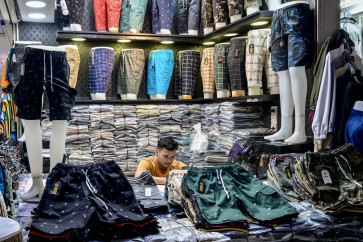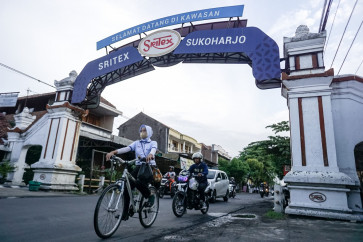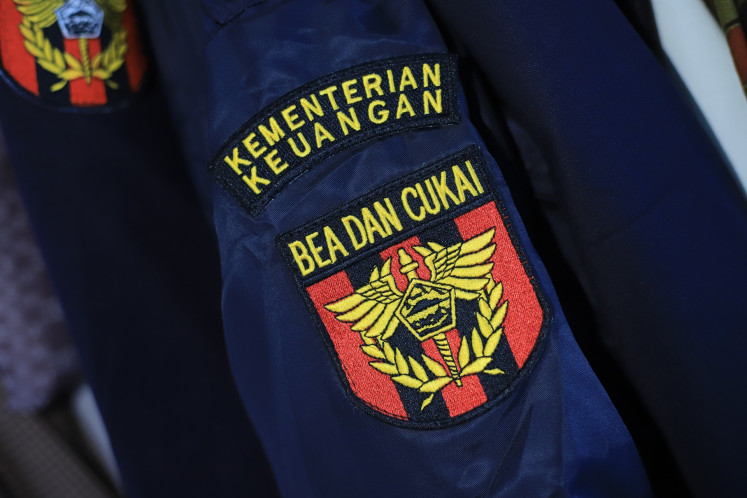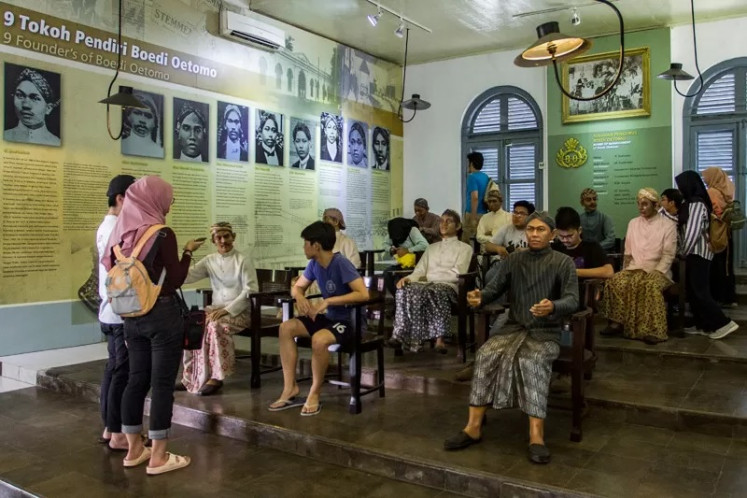President talks up ‘prosperity approach’ for Papua
Peaceful protest: Protesters stage a sit-down demonstration on a road in Manokwari, Papua, on Tuesday
Change text size
Gift Premium Articles
to Anyone

P
eaceful protest: Protesters stage a sit-down demonstration on a road in Manokwari, Papua, on Tuesday. Tuesday’s demonstration was peaceful compared with previous actions that were marked by violent protests against physical and racist attacks on Papuan students in Surabaya and Malang in East Java recently.(Antara/Tomi)
President Joko “Jokowi” Widodo has said he will focus on continuing an approach based on dialogue and prosperity to deal with the unrest that has flared up in Papua and West Papua in recent weeks.
“We have approached Papua through dialogue and prosperity,” he said in a meeting with the editors-in-chief of several press organizations, including The Jakarta Post, at the State Palace in Central Jakarta on Tuesday.
Jokowi said he had implemented this approach during his first five years in office by visiting Papua and West Papua at least two or three times a year, more than any other previous president, in an effort to build trust with Papuans.
He also said the government had also constructed physical infrastructure in the region to reduce economic inequality.
“We have taken a close look at the situation in Papua and evaluate it every year,” he said. “Without such infrastructure development, the situation would be even worse.”
Jokowi said the next step the government would take was to ensure the special autonomy funds for the two provinces were used correctly to develop industries and markets there.
The country’s easternmost provinces have been rocked by protests and rioting since Aug. 19, following an incident in which Papuan university students living in a dormitory in Surabaya, East Java, were subjected to physical and verbal attacks by security personnel and members of mass organizations.
Jokowi said he felt his efforts to build trust with Papuans had succeeded, as evidenced by his overwhelming electoral wins in Papua and West Papua in this year’s presidential elections.
“Just because of one thing, it’s as if [their trust] has totally broken. [Papuans] feel like we’re not serious about developing Papua when actually, it’s the opposite,” he said.
Coordinating Political, Legal and Security Affairs Minister Wiranto said separately that the government had established thousands of public facilities including schools, hospitals and health centers in recent years to better develop the quality of human resources in the country’s easternmost region.
“So, we have concrete evidence that the government is really trying to accelerate Papua and West Papua’s development,” he said, pointing out that the government had disbursed quite a lot of money for the development. In 2018 alone, funds allocated for the region amounted to around Rp 92 trillion (US$6.47 billion), much greater than its regional income of Rp 26 trillion in the same year.
As evidence of the government’s success in developing the two provinces, Wiranto also cited Papua and West Papua’s human development index (HDI), which had increased in recent years.
Wiranto said if the situation in Papua and West Papua remained calm, the government would lift the internet blackout it had imposed on the two provinces. However, he said there would be restrictions on foreign travel to the region. But as the government continued to play up its achievements in the two provinces, Papuan activists and rights groups pointed out its many failures.
Papuan Students Alliance (AMP) chairman Jhon Gobay said the government had failed to address the many human rights abuses that had occurred over the years.
The Nduga Solidarity Civil Society Coalition, for example, reported earlier this month that 182 civilians in Nduga regency, Papua had died of hunger and other illnesses after being displaced from their homes as a result of the ongoing conflict between the Indonesian Military and armed rebels linked to the Free Papua Movement.
“The prosperity of the Papuan people cannot be measured by how much infrastructure has been built,” Jhon told the Post on Tuesday. “How can Papuans develop themselves if they have to live under prolonged military pressure and military operations?”
He said Jokowi’s focus on infrastructure had not brought much benefit to native Papuans and only served to make it easier for business owners to exploit Papua’s vast natural resources. “What the Papuan people want is the Indonesian government to recognize the people’s rights, including their political rights and their right to self-determination,” he said.
Commission for Missing Persons and Victims of Violence (Kontras) commissioner Yati Andriyani said while Jokowi’s “prosperity approach” was not necessarily wrong, it was not sufficient to address the problems faced by Papuans.
“It’s clear that it is not enough because despite everything the government claims that it has done, Papuans continue to express their feelings of injustice and their desire for self-determination,” she said.









